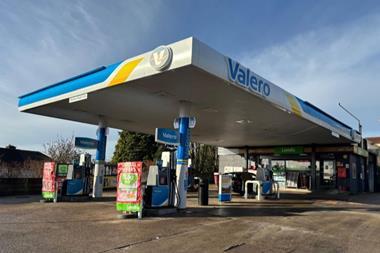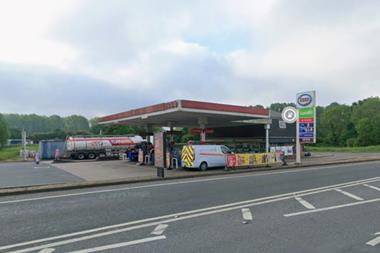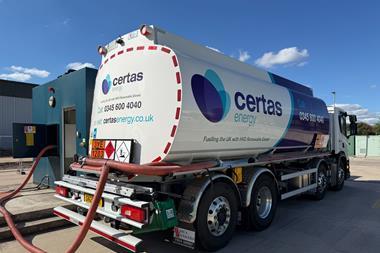The future of fuels - and motoring - is green. But that doesn’t mean we’ll all have to start driving powerless box-shaped vehicles.
That was the message from TV presenter and motoring journalist Quentin Willson at the Forecourt Trader Top Indies Fuel Track Day in Castle Combe, Wiltshire, last month.
The former Top Gear presenter was the celebrity guest speaker at the mini conference during the event, which combined fun on the track with a serious look at the future of fuel and its potential consequences for fuel retailers.
Willson outlined his vision for the future of fuels to the industry’s top independent retailers.
And the self-confessed car lover said there was no point waiting any longer, because the demand for greener motoring had already arrived.
"It’s here, it’s now, the change is going to happen - and we have to get with it right now," he told the audience.
"I think this is one of the most exciting times in the history of transport and the motor car. We will be driving exciting cars that go fast and produce low emissions."
About 70 people attended the conference - the first event of its kind organised by Forecourt Trader.
Attendees learned that while Willson was well aware of the climate change debate, his focus was more about the environment today.
He stressed that he wanted to see the government get involved with financial incentives to encourage more drivers to use alternative fuels.
He said motorists needed to change their behaviour and the way they fuelled their cars, mainly because of the way we are all polluting our planet.
"We could spend a long weekend trading statistics about it and get absolutely nowhere - it would be like wrestling with a mattress full of treacle," he explained.
"But I’m not going to go down that road. We need to change the way we fuel our cars. We cannot continue turning the sky into the colour of curdled milk. Look into any city and there is a palpable brown haze. We’ve been doing it for the past 50 years and we can’t keep doing it any more."
Willson went on to quote some scary statistics. He said the UK produced the same amount of pollution in just six weeks as it did in the whole of 1957, "and with India and other developing countries fast catching up with our way of life, it’s like a time bomb".
Willson also stated that we cannot carry on with "these stupid, senseless" wars over who owns the oil fields. In his words: "It’s pointless."
"And another reason - we cannot carry on pegging our economies globally to the fluctuating price of fossil fuels. We’ve been doing it for long enough."
But Willson said this move towards change was not being driven by the government, but by the car companies, the oil companies and the public.
"The oil companies are spending huge amounts to develop fuels with zero carbon emissions," he said.
But Willson believes what we really need is fuel incentives and more support from the government. He compared the UK to Sweden, where alternative fuels and greener cars have really taken off.
The Swedish government has offered incentives like subsidising biofuel by 30p a litre, the maximum allowed under EU law. Users also benefit from half price car tax and free city centre parking, plus they are exempt from the congestion charge.
Willson said: "It shows what you can do if you have a political will to do it."
He wants to see a similar scheme in the UK, but said this would just be the beginning. "Biofuels in general, I think, will be a stepping stone to the next solution.
"We need to get to the second and third stages, we need to be able to make alternative fuels in a lab."
But Willson remained optimistic about the future, saying he had recently driven an impressive hybrid car that went at 135 mph - "and the stuff coming out of the tailpipe is clean enough to drink".
He also mentioned Ken Livingstone’s attempts to cut pollution in London -he will soon have a fleet of 70 hydrogen buses on the roads of the capital.
But one thing Willson was adamant about was that the government needed to act to make alternative fuels more attractive to motorists: "The public will not change their habits without fuel incentives," he said.
Other speakers at the conference included Caitriona O’Rourke, fuels marketing manager for Europe at Chevron. The oil company, whose UK service station network is branded Texaco, is investing heavily in alternative and renewable energy. It spent $2 billion on the technology between 2002 and 2006, and expects to spend another $2.5bn between 2007 and 2009.
According to O’Rourke, there were three reasons behind this: the security of the energy supply - ie the EU needs to import an increasing percentage of its energy; climate change; and rural development.
She told the audience: "One thing is clear, the era of ’easy oil’ is over. It’s still out there but it’s harder to get at."
O’Rourke said the main fuels that Chevron was focusing on for the middle and long-term wwere bio butanol and hydrogen. However ethanol was the focus for the short term.
She explained that ethanol was made from crops like potatoes, sugar beet and sugar cane and could be blended with petrol in any ratio.
"But it is expensive and there are environmental issues such as sustainability. Plus, it is still to be proved just how beneficial it is to the environment."
She said bio butanol had a higher density and was easier to blend - it could be blended at the refinery, and there were fewer issues with transportation.
O’Rourke said hydrogen was a far cleaner form of energy which could be produced from a diverse array of sources. Chevron has two hydrogen stations in California.
But there were substantial hurdles to producing, storing and distributing the fuel, while techonological breakthroughs were still required.
She said in the future there will be a fuel-cell vehicle run on hydrogen which has zero emissions from the exhaust pipe - but this would be decades away.
O’Rourke’s predictions for the future of fuels were summarised as:
? Hydrocarbon fuels will remain dominant for the next 20 to 25 years.
? There is no single solution - issues of dependency, reliablility of supply, environmental footprint and cost apply to all fuels to some degree.
? Biofuel use will continue to grow - but new technologies like Generation 2 biofuels must offer tangible benefits to consumers and real-world well-to-wheels benefits to the environment.
? The fuel economy is going to grow to be a huge issue. Energy efficiency and conservation are crucial.
Also speaking on the day was Rupert Furness from the Cleaner Fuels and Vehicles Division of the Department for Transport.
Furness is an expert on biofuels and is responsible for advising Dft ministers on a wide range of transport and environmental issues.
He said pollution and climate change were at the top of the political agenda, and the development of alternative fuels was big news.
Furness talked about the government’s Renewable Transport Fuel Obligation (RTFO), which would make oil companies put a certain percentage of biofuels into the fuel they sell.
The RTFO will be introduced next April, with oil suppliers given an initial target of putting 2.5% biofuels in their fuel.
Furnish spelled out the pros and cons of biofuels, adding: "We must remember that this is unchartered territory. It is important we get it right." The RTFO is due to go live on April 15.
Finally, the audience got a glimpse of the type of cars we’re likely to be driving in the future.
Designers at Saab have been looking ahead with plans for greener vehicles.
David Pugh, general manager of sales and marketing for Saab GB, said the increasing mobility of the population was putting a strain on the climate, our health and the oil supply.
And this meant there was a need for companies to change their strategies.
He said Saab was ahead of the game.
"We need to do something," he said. "Doing nothing is clearly not an option." He said Saab had been experimenting with flexfuels since the early 1990s.
Its current range of Saab BioPower cars includes the Saab 9-5 BioPower - saloon and estate, and the Saab 9-3 BioPower - saloon, SportWagon, convertible.
Looking further ahead, there is also the impressive-looking Saab Aero X Concept. "If the future is that you have to drive around in something like a phone box with castors, people are not going to buy it. You’ve got to build nice cars, and they’ve got to be easy and simple to use. Take all the barriers away. Give them the right solution and they’ll do it. The Saab Aero X has 400bhp, 2.8 litre V6 BioPower flex-fuel engine and can use 100% bioethanol for zero fossil CO2 emissions," he said.
This car, which was voted the best concept car of the Geneva 2006 show, does 0 to 62mph acceleration in just 4.9 seconds. It also has a top speed of 155mph. According to Pugh, the Aero X proves that even an extreme sports car can be environmentally sound.
Another car of the future is the Saab BioPower Hybrid Concept, which has a 260 bhp Saab BioPower engine running on E100 fuel.
Pugh said the company was focused on bioethanol which could help reduce dependence on oil: "We are picking up momentum. You will see a lot more from us soon!"
He said the Saab ’green’ vehicles were particularly popular in Sweden, where there were more than 900 E85 filling stations (up from 140 in 2004). This compares to about 15 in the UK today. Pugh said there were 36,617 ’green’ vehicles in Sweden, with the Saab 9-5 BioPower accounting for 30% of the market. And of the Saabs sold in Sweden, more than 90% were now BioPower models.
"The average driver drives 9,500 miles per year, consuming 1,350 litres of petrol," said Pugh. The average Saab BioPower driver - if driving 9,500 miles per year - would consume 1,755 litres of E85, of which 263 litres would be petrol. "Therefore every Saab BioPower driver can reduce their dependence on oil by 1,087 litres per year."



























No comments yet